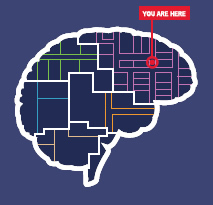 Once every 10 years a special conference is held to explore what we know about the cognitive neuroscience of our brain’s frontal lobes. The conference is called The Frontal Lobes and was held last week. Progress over the last 10 years has been tremendous:
Once every 10 years a special conference is held to explore what we know about the cognitive neuroscience of our brain’s frontal lobes. The conference is called The Frontal Lobes and was held last week. Progress over the last 10 years has been tremendous:
Drs. Stuss and Knight are world-renowned frontal lobes experts who produced the last global conference on the frontal lobes 10 years ago in Toronto. They say the last decade has been a gold mine of new knowledge and given rise to emerging fields such as social neuroscience, neuroeconomics, neuroscience and the law, neuromarketing, neurodevelopment and neurorehabilitation.
Of special interest to readers of the Next Brain Blog is the focus on techniques for improving cognitive performance. A post on the conference blog, We can enhance cognitive performance in later years!, provides a nice review of techniques that have scientific support. These include:
- Intensive cognitive training
- Playing video games
- Aerobic exercises
- Delaying retirement or staying mentally active after retirement
In addition, cognitive decline with age is not as inevitable as once thought. Some studies showed variability among individuals and even some cases of spontaneous reversal
“Dr. Lars Nyberg (Umea University, Sweden), a former post doc at the Rotman Research Institute – presented data from a large study that has followed the physical and cognitive health of over 4,000 adults aged 35 – 80 years during a two-decade period to see when brain failure starts to show. He found that the decline starts gradually around the mid 30s and then nose-dives around 60-65 years of age. But if there is a silver lining here, it is that all older adults are not alike in this trajectory. Studies have found variability of cognitive performance. In fact, there have been “rare” cases of spontaneous positive reversals of decline in this age group.”
These techniques and points of view have been covered elsewhere in this blog. The Frontal Lobes conference provides impressive scientific support for believing we now have the know-how, technologies and supplements for enhancing our cognitive performance and developing more resilient and longer-lasting brains.
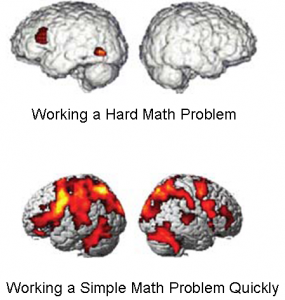 Doing simple calculations (3 + 5 = ?) very fast is becoming a popular brain training technique. It was pioneered by Dr. Ryuta Kawashima a Neuroscientist from Japan. He is well-known for the book Train Your Brain: A Better Brain in 60 Days, and BrainAge the Nintendo-based brain fitness system that we have covered on the Next Brain Blog before.
Doing simple calculations (3 + 5 = ?) very fast is becoming a popular brain training technique. It was pioneered by Dr. Ryuta Kawashima a Neuroscientist from Japan. He is well-known for the book Train Your Brain: A Better Brain in 60 Days, and BrainAge the Nintendo-based brain fitness system that we have covered on the Next Brain Blog before.
Similar techniques are popping up in many other brain training games and programs, especially those designed for mobile phones. For example, check out the Brain Blast Trainer series of iPhone apps.
The question is, does a daily dose of rapid mental mathematics improve your cognition, and if so in what way?
I have not been able to find literature that deals with this question. Dr. Kawahima’s research however, seems to clearly indicate (see figure) that doing simple math calculations rapidly stimulates the brain far more than doing hard math problems. Working the brain hard, like working a muscle hard should make it “bigger and stronger”.
I would like to hear from readers that use simple math as part of their brain fitness workout.
Source: Brain scanning images adapted from BrainAge Instruction Booklet
 We get vitamin D mainly from the sun’s UV rays, fatty fish, fortified milk or cereals and supplements like a multi-vitamin. D has been in the news lately because there are widespread deficiencies and growing evidence that it supports brain development in children and improved processing speeds in older adults. But the situation is far from conclusive. As recently reported by the Dana Foundation in Vitamin D and the Brain: More Good News,
We get vitamin D mainly from the sun’s UV rays, fatty fish, fortified milk or cereals and supplements like a multi-vitamin. D has been in the news lately because there are widespread deficiencies and growing evidence that it supports brain development in children and improved processing speeds in older adults. But the situation is far from conclusive. As recently reported by the Dana Foundation in Vitamin D and the Brain: More Good News,
Vitamin D has many roles in regulating brain health, from aiding the development of the brain and nervous system to postponing decline toward the end of life, according to a growing body of research. R. Douglas Shytle and Paula C. Bickford review the field and argue that while it is clear that many people worldwide experience vitamin D deficiency, we need to complete much more research to fully understand the consequences of this deficiency for brain health.
And the research is underway. Watch for additional posts on the importance of D for improving cognitive performance on the Next Brain Blog.
Source: Vitamin D Image
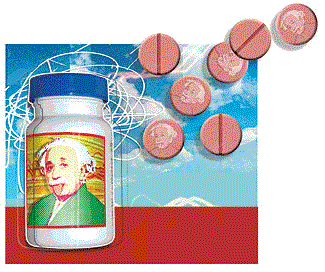 Drugs designed for Alzheimer’s disease, ADHD, narcolepsy and other neurological disorders are finding new off-prescription use as cognitive enhancers. Students, professionals and many other citizen have reported using prescription-only drugs such as Aderaal (a form of ritlan for ADHD) and Modafinil (a stimulant used to treate narcolepsy) to boost mental performance. Typical non-medical uses of these “smart drugs” include efforts to improve concentration, enhance memory and create mental energy.
Drugs designed for Alzheimer’s disease, ADHD, narcolepsy and other neurological disorders are finding new off-prescription use as cognitive enhancers. Students, professionals and many other citizen have reported using prescription-only drugs such as Aderaal (a form of ritlan for ADHD) and Modafinil (a stimulant used to treate narcolepsy) to boost mental performance. Typical non-medical uses of these “smart drugs” include efforts to improve concentration, enhance memory and create mental energy.
Using smart drugs without a prescription is illegal but they are easily available on the internet and from street sources. As reported in the commentary, Toward responsible use of cognitive-enhancing drugs by the healthy, in the prestigious scientific journal Nature:
“Today, on university campuses around the world, students are striking deals to buy and sell prescription drugs such as Adderall and Ritalin — not to get high, but to get higher grades, to provide an edge over their fellow students or to increase in some measurable way their capacity for learning.”
And it is not just students but professors, physicians, lawyers, engineers and many other professionals.
Not surprising there is little or no scientific evidence that these drugs work to enhance cognitive performance of healthy people. However, the subjective effect of increased mental energy seems unmistakable.
With many people experimenting with smart drugs, and a growing number of calls for studying their use to achieve peak cognitive performance, they will be a frequent topic in the Next Brain Blog.
Please leave a comment if you have experience in using smart drugs that you want to share with other readers.
Source: Image of Smart Drugs
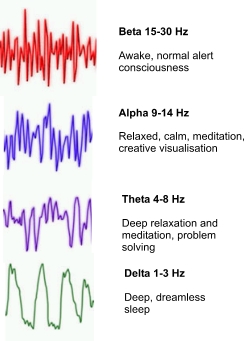 Neurofeedback training devices translate brainwaves into an external signal such sounds, graphs on a computer screen, movement of your computer’s cursor, action in a video game and even the motion of remote controlled toys. Being able to hear or see your brainwaves in this way provides essential feedback for learning how to control them to improve mental focus, modulate your mood and sharpen your thinking.
Neurofeedback training devices translate brainwaves into an external signal such sounds, graphs on a computer screen, movement of your computer’s cursor, action in a video game and even the motion of remote controlled toys. Being able to hear or see your brainwaves in this way provides essential feedback for learning how to control them to improve mental focus, modulate your mood and sharpen your thinking.
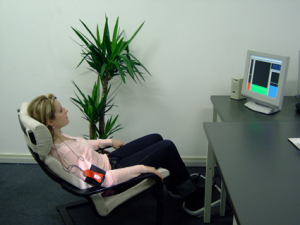 Neurofeedback has been proven to work in a clinical setting. You can go to a therapist and in about 10 weeks achieve some real results. A typical setup is shown to the left.
Neurofeedback has been proven to work in a clinical setting. You can go to a therapist and in about 10 weeks achieve some real results. A typical setup is shown to the left.
Devices for use by consumers at home are starting to hit the market. There are general purpose brain computer interfaces (BCI) such as the EPOC headset from Emotiv. It sells for $300 and comes with some basic games.
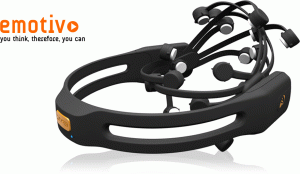
The only other consumer-level BCI I am aware of is being sold by Neurosky. It is cheaper ($199) but it comes with a single sensor versus the 14 for EPOC. The Neurosky technology is being used to develop mind-controlled toys. Check out Mattel’s Mindflex below.
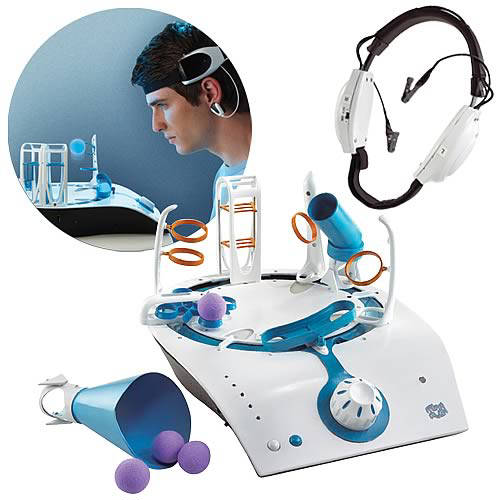
It is not clear if the at-home neuofeedback devices are producing results or if they even work well. Consumer reviews tend to be mixed. For example, Mindflex Game has 58 customer reviews on Amazon:
- 5 star (14)
- 4 star (18)
- 3 star (8)
- 2 star (6)
- 1 star (12)
No matter, as the technology improves there can be little doubt that neurofeedback devices will become a powerful force for improving our cognitive performance. Brain computer interfaces, mind controlled toys and video games as well as other consumer-level neurofeedback devices will be covered frequently in the Next Brain Blog.
I am very interested to hear from readers that use neurofeedback in a clinical setting or at home. Please leave a comment and share your experiences.
Source: Image of Brainwaves and clinical use of Neurofeedback.
 Perhaps not but asking why five times in a row is a simple and proven technique for getting to the root cause of a problem or issue. And getting to the root cause greatly improves your odds of finding good solutions.
Perhaps not but asking why five times in a row is a simple and proven technique for getting to the root cause of a problem or issue. And getting to the root cause greatly improves your odds of finding good solutions.
The technique known as the five-whys was originally developed by Sakichi Toyoda, often called the father of the industrial revolution in Japan. Let’s assume for example that a customer order is not shipped from the dock on time. Here is how the technique works:
- Why1: Why did the shipment not leave the dock on time?
- The order was not completed before the last truck left
- Why2: What the order not complete?
- The automated assembler on line 3 broke down
- Why3: Why did the automated assembler break down?
- We failed to complete the maintenance schedule and the the control froze
- Why4: Why did we fail to complete maintenance?
- Frank, a new employee forgot to do it
- Why5: Why did Frank forget to do it?
- It was not included in his new employee training
Although a bit simplistic it shows the power of the five-whys technique for driving thinking to the root cause. A problem with a customer order was ultimately caused by a fault in new employee training. Learning such simple techniques is a powerful way to improve cognition and so they will be a frequent topic on the Next Brain Blog.
For a more detailed overview, including some of the short comings of the technique check out How to use the Five WHY approach.
Please post a comment and share your success with the five-whys or related problem solving techniques.
Source: Image of the Hand.
 When faced with a long or boring lecture, phone call or other interaction doodling can improve your recall of key information by 29%. This was the finding of a randomized controlled study recently reported in Applied Cognitive Psychology.
When faced with a long or boring lecture, phone call or other interaction doodling can improve your recall of key information by 29%. This was the finding of a randomized controlled study recently reported in Applied Cognitive Psychology.
This is a strange finding because normally a second task would distract us and lower performance. Jackie Andrade, the University of Plymouth professor that did the research believes that the doodling may work because it keeps us from engaging in daydreaming and losing focus completely.
Doodling in the face of boredom then becomes a way to maintain not disrupt mental focus and should result in improved recall and learning.
Although simple, any technique for maintaining mental focus in a difficult task environment (boring, interruption prone, noisy, etc.) is key to improving cognitive performance and will be covered on the Next Brain Blog.
I am interested in hearing from readers that use doodling or other secondary techniques to improve mental focus.
Source: A doodle from Henri Poincaré’s Student Notebook
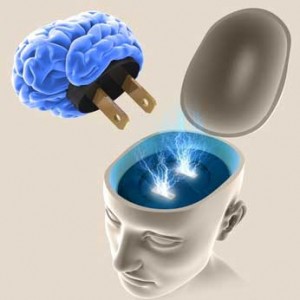 Then learn to manage your mental energy!
Then learn to manage your mental energy!
Science has made considerable inroads over the last few years defining, measuring and understanding the role mental energy plays in cognitive performance. Mental energy is defined as the combination of the ability to do mental work, the motivation for doing that work and your subjective feeling of fatigue. Key findings about mental energy include:
- We only have so much to use – it is a limited resource
- Exercising self-control or regulating our thoughts, emotions and behavioral responses burns considerable mental energy – much more than other cognitive processes such as learning and decision-making
- Running low on mental energy means loss of impulse control
- We can do specific things to replenish our supply of mental energy
Given the central role that mental energy (and its management) plays in cognitive performance it will be a frequent topic on the Next Brain blog.
Techniques for getting started in managing your mental energy include:
- Measuring your level of self-control and other cognitive tendencies that make extensive use of mental energy
- Journaling to understand how you wisely (or not) you use mental energy throughout the day
- Planning or budgeting your mental energy so you don’t set goals or engage in activities that result in sever depletion
- Developing habits that naturally restore your supply
Little things make a big difference when it comes to managing mental energy.
Read more…
 There is growing evidence that a fast-track approach to mediation may in fact produce results in as little as five days. This would be a breakthrough as using mindfulness or mediative techniques to improve your cognitive functioning normally takes months or years.
There is growing evidence that a fast-track approach to mediation may in fact produce results in as little as five days. This would be a breakthrough as using mindfulness or mediative techniques to improve your cognitive functioning normally takes months or years.
The technique is called integrative body-mind training (IBMT) and requires 20 minutes per day for five days. Subjects with no previous training in mediation techniques showed significant improvements in mental focus, mood and stress.
The process involves using a number of techniques together under the guidance of a coach. The seminal article on IBMT, Short-Term Medication Training Improves Attention and Self-Regulation, describes it this way:
“Training in this method is followed by 5 days of group practice, during which a coach answers questions and observes facial and body cues to identify those people who are struggling with the method. The trainees concentrate on achieving a balanced state of mind while being guided by the coach and the compact disc that teaches them to relax, adjust their breathing, and use mental imagery.”
A more detailed description of how this works over a five day period can be found in this Introduction to IBMT written by Dr. Yi-Yuan Tang a pioneer in the field.
I am interested to hear from readers that can recommend a coach, suggest resources or share experiences about IBMT. I’d like to try it and write additional posts for the next Brain Blog.
Source: Image of running man.
 According to a news release by the American Heart Association, a diet developed to improve blood pressure combined with aerobic exercise over a four month period appears to improve the mental functioning of older overweight adults. Researchers claim mental functioning improved by 30%. Quoting the news release:
According to a news release by the American Heart Association, a diet developed to improve blood pressure combined with aerobic exercise over a four month period appears to improve the mental functioning of older overweight adults. Researchers claim mental functioning improved by 30%. Quoting the news release:
“Researchers assessed mental functioning with a battery of neuropsychological tests, including Executive Function-Memory-Learning and Psychomotor Speed. These tests measure cognitive skills involving manipulation of ideas and concepts and planning ahead. The tests were given before and after the four-month treatment program.”
The diet plan is called DASH (dietary approaches to stop hypertension) and involves:
- Eating more fruits, vegetables, whole grains, fish, poultry, nuts and foods rich in magnesium, potassium, and calcium
- Cutting back on red meats high total-fat foods and sweets
If you want to give it a try there are specific guidelines, recommendations and even food plans on The Dash Diet Plan Eating site.
The aerobic exercises were basic but supervised and took place for 30 minutes three times per week.
It is important to note that you have to do both the diet and exercise to get the improvement in mental functioning. Control groups that did one or the other, or nothing showed no improvement in mental functioning. These type of combination effects (doing two or more interventions to get a boost in cognitive performance) are common and will be frequently covered on the Next Brain Blog.
Source: Exercise and Diet Image
 Once every 10 years a special conference is held to explore what we know about the cognitive neuroscience of our brain’s frontal lobes. The conference is called The Frontal Lobes and was held last week. Progress over the last 10 years has been tremendous:
Once every 10 years a special conference is held to explore what we know about the cognitive neuroscience of our brain’s frontal lobes. The conference is called The Frontal Lobes and was held last week. Progress over the last 10 years has been tremendous:











